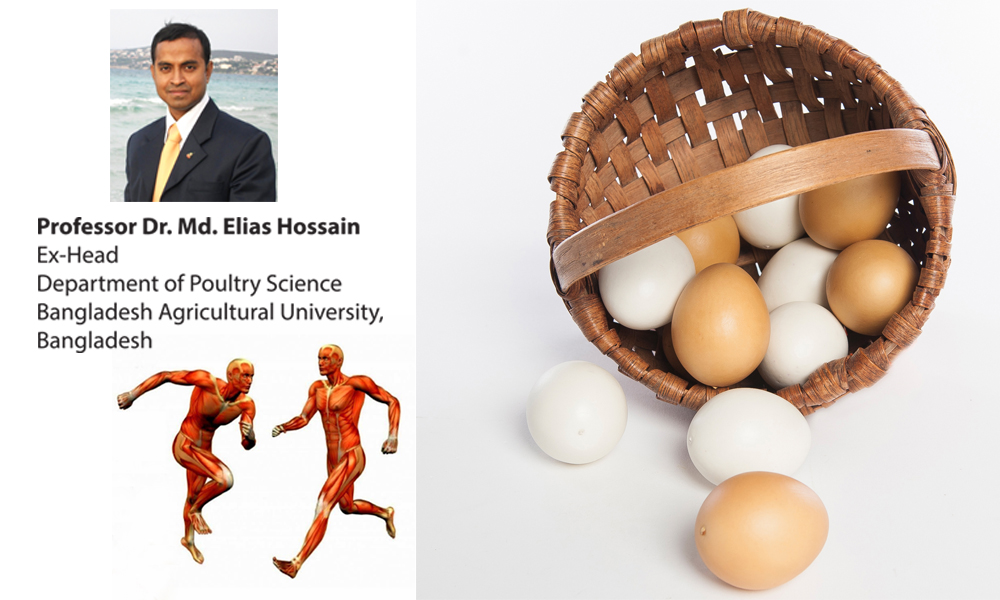World Egg Day was founded by the International Egg Commission (IEC) at a conference held in Vienna in 1996. It is celebrated on the second Friday in October. The idea behind the day was raising awareness across the world, of the important place eggs have in human nutrition. Eggs are one of the few foods that should be classified as “super food.” They are loaded with nutrients, some of which are rare in the modern diet. Eggs are a delicious, nutritious, affordable, and sustainable staple that allows for incredible savoury and sweet dishes for breakfast, lunch, and dinner. Here are 10 health benefits of eggs that have been confirmed in human studies.
1. Eggs are incredibly nutritious
Whole egg contains vitamin such as vitamin A, D, E, K, Thiamin, Riboflavin, Biotin Niacin, B6, B12, Folic acid, Choline, Pantothenic acid and fat such as Saturated fat (1.69g), Polyunsaturated fat (0.95g), Monounsaturated fat (1.95g), Omega 3 fatty acids( 39.0 mg), Omega 6 fatty acids (574 mg). Egg also contains some minerals as like as Calcium, Potassium, Iron, Phosphorus, Zinc and Selenium etc. This comes with 77 calories, 6 grams of protein and 5 grams of healthy fats. Eggs also contain various trace nutrients that are important for health.
2. Eggs supply high quality protein
Proteins are the main building blocks of the human body. They’re used to make all sorts of tissues and molecules that serve both structural and functional purposes. Getting enough protein in the diet is very important and studies show that currently recommended amounts may be too low. Eggs are an excellent source of protein, with a single large egg containing six grams of it. Eggs also contain all the essential amino acids in the right ratios, so our body is well-equipped to make full use of the protein in them. Eating enough protein can help with weight loss, increase muscle mass, lower blood pressure and optimize bone health, to name a few.
3. Eggs are linked to a reduced risk of heart disease
It’s important to keep in mind that cholesterol in the diet doesn’t necessarily raise cholesterol in the blood. HDL stands for high-density lipoprotein. It is often known as the “good” cholesterol. People who have higher levels of HDL usually have a lower risk of heart disease, stroke and other health problems. Eating eggs is a great way to increase HDL. In one study, eating two eggs per day for six weeks increased HDL levels by 10%. LDL cholesterol is generally known as the “bad” cholesterol. It is well known that having high levels of LDL is linked to an increased risk of heart disease. There are small, dense LDL particles and large LDL particles. Egg consumption appears to change the pattern of LDL particle from small, dense LDL (bad) to large LDL, which is linked to a reduced heart disease risk. One review of 17 studies with a total of 263,938 participants found no association between egg intake and heart disease or stroke.
4. Eggs are a good source of omega-3s
Omega-3s are special types of polyunsaturated fatty acids, and are a family of “essential fats” that play an important role in the way your cell membranes work; from heart and brain health through to protecting your eyes. As our body produces a limited amount of Omega-3s on its own, it’s beneficial to actively consume them through various food sources. Eggs are mother natural incredible and edible source of Omega-3 fatty acids, providing on average, 125mg per serve (2 large eggs). Of this amount, majority is the long-chain type of omega-3 fatty acid-which represents between 71-127% of the desired intake for adults.
5. Eggs are rich in choline
Choline is a nutrient that most people don’t even know exists, yet it is an incredibly important substance and is often grouped with the B vitamins. Choline is used to build cell membranes and has a role in producing signaling molecules in the brain. The symptoms of choline deficiency are serious, so fortunately it’s rare. Whole eggs are an excellent source of choline. A single egg contains more than 100 mg of this very important nutrient.
6. Eggs provide a great source of vitamin D
Egg yolks are one of a handful of foods that naturally contain vitamin D. A serving of two eggs provides 82% of your recommended daily intake of vitamin D. Sometimes called the ‘sunshine vitamin’, vitamin D plays an important role in the absorption of calcium and phosphorus- making it essential for the maintenance of healthy bones and teeth. Vitamin D also aids in promoting healthy muscle function and immune system maintenance.
7. Eggs helps to control body weight
Eggs are incredibly filling. They are a high-protein food, and protein is, by far, the most satiating macronutrients. Eggs score high on a scale called the satiety index, which measures the ability of foods to cause feelings of fullness and reduce later calorie intake. In one study, replacing a bagel breakfast with an egg breakfast caused significant weight loss over a period of eight weeks. Eggs are highly satisfying and may reduce calorie intake later in the day. Regularly eating egg may promote weight loss.
8. Eggs help boost nutrient intake for healthy aging
Easy to prepare, eggs are a simple means to increase nutrient intakes for older people, in turn helping to reduce the risk of a wide range of deficiencies and conditions. They also contain a significant amount of leucine, an amino acid that is important for ongoing muscle support, as well as other key nutrients including Vitamin D and Omega-3 fatty acids, plus a little known nutrient, choline, which is important for brain function.
9. Eggs contain antioxidants that are beneficial for eyes
Eggs contain a range of vitamins and minerals including vitamin A, vitamin E and selenium which all act as important antioxidants in supporting eye health, retina function and helping counteract degenerative vision as you age. Eggs are also rich in the antioxidants lutein and zeaxanthin, both of which play a protective role in reducing the risk of certain eye diseases, including cataracts and age-related macular degeneration. Studies show that these antioxidants are also better absorbed by the body from eggs than from alternate plant sources.
10. Eggs can support mental health
A balanced diet can go a long way toward supporting stress reduction and better mental health practices-both reducing the impact of symptoms and optimizing greater performance. Serotonin is synthesized from tryptophan that can reduce stress and anxiety in the nervous system. Yolk and white are extremely rich in tryptophan. When it comes to the headstrong benefits of eggs- the combination of vitamin B2, B12, choline, iron and tryptophan are all associated with helping reduce the risk of anxiety, symptoms of depression and naturally aiding sleep.



